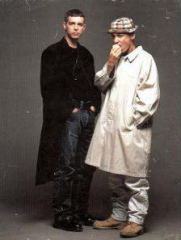Love Comes Quickly

Sooner or later
This happens to everyone
To everyone
You can live your life lonely
Heavy as stone
Live your life learning
But working alone
Say this is all you want
Well I don’t believe that it’s true
‘Cause when you least expect it
Waiting round the corner for you
Chorus
Love comes quickly whatever you do
You can’t stop falling in love
You can live a life of luxury
If that’s what you want
Taste forbidden pleasures
Whatever you want
You can fly away
To the end of the world
But where does it get you to
‘Cause just when you least expect it
Just what you least expect
Chorus
I know it sounds ridiculous
But speaking from experience
It may seem romantic
And that’s no defence
Love will always get to you

Pet Shop Boys - Chris Lowe and Neil Tennant

I first heard of Pet Shop Boys in 1988 when I was 10. It was at a school music camp, which is an irony, since I am the world’s most musically untalented person possible. I can’t play any instruments whatsoever, I can't sing, I can’t even read music notes or scores despite having had numerous lessons in it and I disappointed my high school music teachers who'd earmarked me for their special keyboard lessons, and then later, handbell lessons, thinking I had potential. They were so very wrong. Well, at least they showed some faith in me. Anyhow, we were divided up into groups at the music camp and each group was named after a pop group. I have poignant memories of the camp because it was the first time I’d been away from home and I’d begged my mother to allow me to go. My mother was very protective of me as a child and I ached to have been able to go to all those camps and do things like all the other boys were allowed to do – outdoors that is.
However, it wasn’t until I was in my early 20s that I rediscovered the Pet Shop Boys, or more like ‘really discovered’ them, I should say. I felt an immediate sense of affinity with many of their songs. Their lyrics were bittersweet, full of tension, melancholic and yet they were both depressing and not depressing to listen to at the same time – probably so given their upbeat tempo. I loved and still love their songs, given my own melancholic, manic-depressive nature (not). I just like being a drama king sometimes. But I couldn’t figure out the fuss over why they were seen as ‘gay’ music.
But gay music or not, music is pretty powerful stuff. Someone once said that the surest way to bring down a nation is through its music. If you can control the music the people listen to, you can control their minds. I can’t remember where I’d read that but I think it’d be fair to say that music is indeed powerful stuff – it can stir up all kinds of emotions in us – it draws out all that which is unsaid in our soul and puts it in sync with our heart and mind.

Pet Shop Boys

Love Comes Quickly was and still is among one of my favourite Pet Shop Boys song. I love its tinge of existential thoughtfulness coupled with its bittersweet portrayal of the realities of life. If you read the lyrics to this song, I think you’ll find there’s an element of truth in it about ‘falling in love’ or at least about being single and falling in love.
This is where I begin plagiarising Al Hsu’s work again. No, not really. I give him all the credit. I just think he’s written some fantastic stuff about singleness (although from a distinctively Christian perspective and aimed at those who’ve embraced Christian spirituality) and I want to share some more of his stuff here. He writes in The Single Issue (pp120-123),
Almost everybody grows up expecting to marry. From childhood, we start envisioning our future mate and dreaming about the future family. We live with the expectation of marriage. Because we plan on having a mate, not to have one implies a sense of loss and incompleteness, leading to feelings of loneliness and failure. But as adulthood continues, we encounter a transition time when we discover that our dreams may have been unrealistic.Yes, it may be true that “love comes quickly whatever you do” and that “you just can’t stop falling in love”. And if and when that happens to me again, I sure hope I’ll remember to hold on tight during the roller coaster ride.
“It is not wrong to hope for marriage or to recognise that marriage is a possibility for the future”, Gary Collins says, “but it is not healthy to build our lives around events that are uncertain. Instead, individuals, especially for Christians, must learn both to prepare for the future and to live fully in the present.”
We must recognise that some things in life are more important than whether or not we shall ever marry. We must face the fact that marriage may not be a possibility. When I come to this point I completely hand over my life to God, all my dreams, hopes and desires for a spouse, and tell him that my first priority will be to find my identity in Christ and him alone. This reckoning is a kairos moment – a significant moment in time in which I acknowledge that I am called to live my life fully for Christ regardless of my marital status or sexual orientation (italics mine).
If the desire to marry or couple up (italics mine) is overwhelming, if thoughts of marriage dominate our thinking, and if every person…is viewed as a potential partner, then the desire for marriage has become idolatrous. It is almost a lust for marriage, not unlike a lust for sex. I once read about a man who complained that single women he met stared at his bare ring finger the way men might stare at a woman’s breasts. Much like being seen as a sex object, he felt as if he was being viewed as a ‘marriage object’.
Richard Foster calls this kind of ‘reckoning’ – this living sacrifice experience ‘relinquishment’. The way of relinquishment is the movement from ‘my will be done’ to ‘not my will, but yours’. This process involves struggle, because it is difficult to give up those desires and dreams that are so dear to us. But this is just the process. Foster says, “Struggle is important because the Prayer of Relinquishment is Christian prayer and not fatalism. We do not resign ourselves to fate… We are not locked into a preset, determinist future. Ours is an open, not a closed universe. We are ‘co-labourers with God’, as the apostle Paul put it – working with God to determine the outcome of events. Therefore our prayer efforts are a genuine give and take, a true dialogue with God – and a true struggle.”
Reckoning and relinquishment do not mean that we lose all that we have ever hoped for in life. Foster reminds us, “We are dealing with crucifixion of the will, not the obliteration of the will. Crucifixion always has resurrection tied to it.” Death is a central theme in Christian theology only because it prepares the way for the glory of the resurrection. God allows us to continue living after the reckoning point because people who are fully committed to him can be the most productive for the cause of Christ.
But relinquishment is not a state at which we arrive suddenly, nor once and for all. It is a slow pilgrimage, and there are many stumblings and bruisings along the way. And such a reckoning isn’t only for singles. All followers of Jesus (words mine), regardless of their marital or relationship status (italics mine) need to come to the point where they place God as the top priority in their lives.
The late Walter Trobisch wisely wrote, “The art of giving up, of renouncing, is also the secret of happiness in a person’s life. To give up one’s self is as important for a single person as it is for one who is married. Those who learn this art will never be lonesome, even if they are single. Those who don’t will always be lonesome, even though they are married.”



